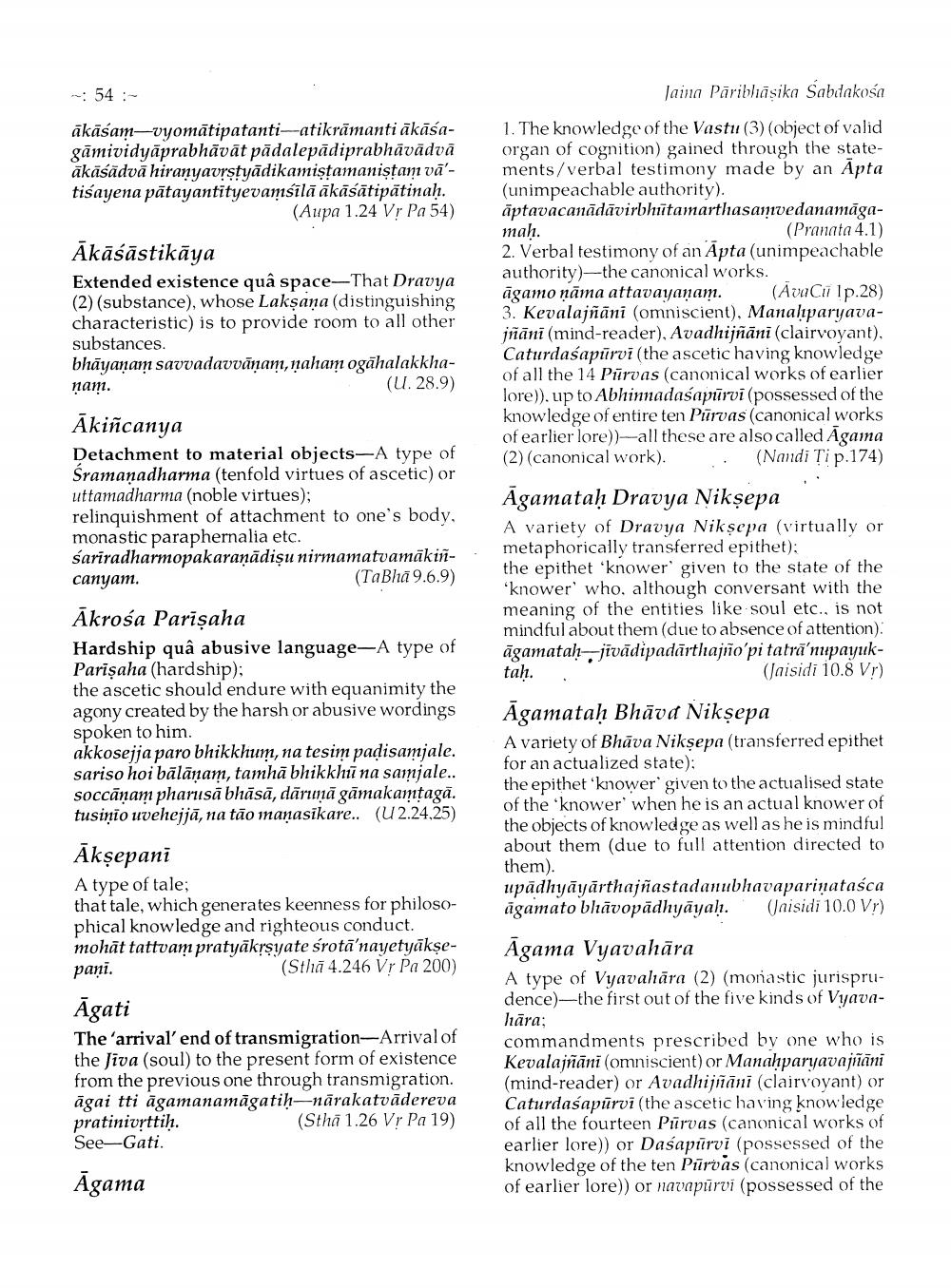________________
54:
Jaina Pāribhāsika Sabdakosa
ākāśam-vyomātipatanti-atikrāmanti ākāśagāmividyāprabhāvāt pādalepādiprabhāvādva ākāsädvä hiranyavrstyādikamistamanistan va'tiśayena pātayantityevamsilā ākāsätipätinah.
(Aupa 1.24 V! Pa 54)
Ākāśāstikāya Extended existence quâ space-That Dravya (2) (substance), whose Laksana (distinguishing characteristic) is to provide room to all other substances. bhāyanam savvadavvānam,naham ogāhalakkhaņam.
(U. 28.9)
1. The knowledge of the Vastu (3) (object of valid organ of cognition) gained through the statements/verbal testimony made by an Apta (unimpeachable authority). āptavacanädāvirbhiitamarthasanvedanamāgamah.
(Pranata 4.1) 2. Verbal testimony of an Apta (unimpeachable authority)--the canonical works. āgamo ņāma attavayanam (AvaCu 1p.28) 3. Kevalajñāni (omniscient), Manalıparyavajñāni (mind-reader), Avadhijñāni (clairvoyant), Caturdaśapūrvi (the ascetic having knowledge of all the 14 Pürvas (canonical works of earlier lore)). up to Abhinnadasapurvi (possessed of the knowledge of entire ten Purvas (canonical works of earlier lore))--all these are also called Agama (2) (canonical work).
(Nandi Tip.174)
Ākiñcanya Detachment to material objects-A type of Sramanadharma (tenfold virtues of ascetic) or uttamadharma (noble virtues); relinquishment of attachment to one's body, monastic paraphernalia etc. śarīradharmopakaraņādişu nirmamatvamākinсапуат.
(Ta Bhā 9.6.9) Akrośa Parişaha Hardship quâ abusive language-A type of Parisaha (hardship); the ascetic should endure with equanimity the agony created by the harsh or abusive wordings spoken to him. akkosejja paro bhikkhum, na tesim padisamjale. sariso hoi bālāņam, tamhā bhikkhu na sainjale.. soccāņam pharusā bhāsā, dārunā gāmakamtagă. tusiņio uvehejjā, na tāo manasikare.. (U 2.24,25)
Agamataḥ Dravya Nikṣepa A variety of Dravya Nikṣepa (virtually or metaphorically transferred epithet); the epithet 'knower' given to the state of the
knower' who, although conversant with the meaning of the entities like soul etc., is not mindful about them (due to absence of attention). āgamatah-jivādipadārthajño'pi taträ'nupayuktah.
(Jaisidi 10.8 Vr)
Āgamataḥ Bhāvd Niksepa A variety of Bhāva Nikṣepa (transferred epithet for an actualized state); the epithet 'knower given to the actualised state of the knower' when he is an actual knower of the objects of knowledge as well as he is mindful about them (due to full attention directed to them). upādhyāyārthajñastadanubhavaparinatasca āgamato bhāvopādhyāyaḥ. Joisidi 10.0 Vr)
Aksepani A type of tale; that tale, which generates keenness for philosophical knowledge and righteous conduct. mohāt tattvam pratyākrsyate śrotā'nayetyākṣepani.
(Sthā 4.246 Vr Pa 200)
Agati The 'arrival' end of transmigration-Arrival of the Jiva (soul) to the present form of existence from the previous one through transmigration. āgai tti ägamanamāgatih-närakatvädereva pratinivrttih.
(Sthā 1.26 Vr Pa 19) See-Gati.
Agama Vyavahāra A type of Vyavaltāra (2) (monastic jurisprudence)-the first out of the five kinds of Vyavahāra; commandments prescribed by one who is Kevalajñāni (omniscient) or Manahparyavajñāni (mind-reader) or Avadhijiani (clairvoyant) or Caturdaśapūrvi (the ascetic having knowledge of all the fourteen Purvas (canonical works of earlier lore)) or Dasapirvi (possessed of the knowledge of the ten Pūrvas (canonical works of earlier lore)) or navapurvi (possessed of the
Agama




